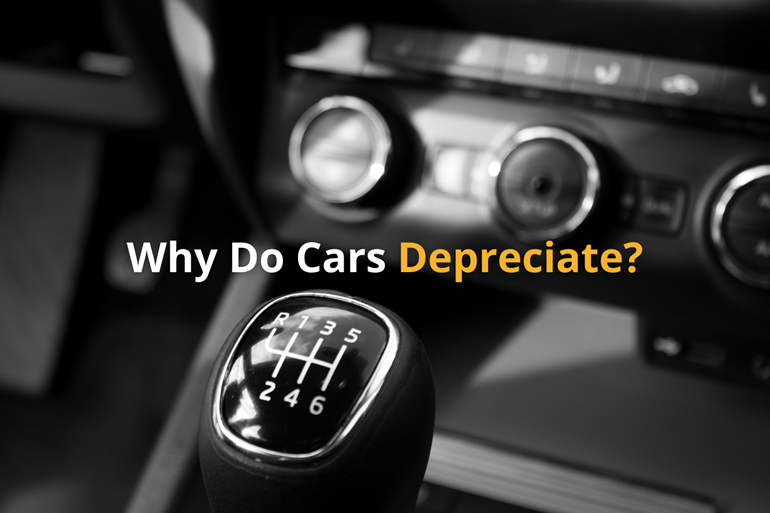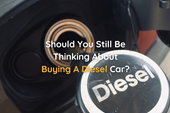
Why Do Cars Depreciate?
Worried About Depreciation? Not Sure Of The Impact? Here's Everything You Need To Know.
Understand And Minimise Your Car's Depreciation With Our Expert Insights…
Three things in life are certain; death, taxes and car depreciation. Unless you’re lucky enough to own a classic or something ultra-rare, your car will inevitably experience some loss in value over its lifetime.
Not only does depreciation cost you when it comes to reselling or trading in your car, but it could put you at financial risk during your ownership; especially if you have an accident, fire or if it’s stolen.
In this article, we’re taking an in-depth look at what causes car depreciation and some ways you could minimise it. First, let’s look at some of the basics of car depreciation…
What Is Car Depreciation?
Depreciation essentially refers to the amount of value your car loses over its lifetime; with the amount varying year on year. Typically, depreciation is specified as a percentage, so for instance, if your £10,000 car is worth £7,500 after one year, it would have depreciated 25%
In rare circumstances such as with high-performance, limited edition or increasingly rare classic cars, depreciation may be minimal or, if you’re lucky, your car could increase in value.
This was the case with a lot of cars during and post-COVID too; due to the increased demand, but since the market has stabilised, depreciation has reverted to a thing of the norm.
Sadly, the majority of cars, from entry-level hatch-backs to luxury saloons will be worth less than you paid for them, pretty much from the moment you drive it away.
How Much Do Cars Depreciate?
The amount of depreciation your car experiences will usually depend on the amount of time you have it as well as the factors we’ll be covering below. However, if you want a general rule of thumb, here’s how much cars usually depreciate:
- Year One: 15-35% depreciation.
- Year Two: 35-50% depreciation.
- Year Three: Up to 50% depreciation.
What Happens If My Car Depreciates Before It’s Written Off?
Obviously, depreciation will have financial implications when you come to sell or trade-in your car, as it’s going to be worth a lot less than you paid for it. This often means, that to stay in a similar new vehicle, you’ll need to add some of your own money (usually as a ‘Deposit Contribution’).
Most people don’t realise however, that depreciation could cause issues whilst you own it, especially if you experience a total loss.
Total Loss is an insurance term which refers to an incident, such as fire, theft or accident resulting in the car being completely unsalvageable. When this happens you’ll have to deal with your car insurer to reach a ‘final settlement’; the amount they pay out.
Insurers usually arrive at their final settlement figure based on the amount your car is worth at the time of a total loss, not the amount you paid or still owe. Depreciation means that you could be left with a much lower settlement figure, leaving you to cover the rest.
Why Do Cars Depreciate?
Now we’ve covered some of the basics of depreciation, let’s take a look at the common causes.
Make & Model: Some manufacturers are renowned for holding their residual value, with particular models seeing less depreciation thanks to a reputation for reliability.
Conversely, cars that are thought to be unreliable, or undesirable thanks to brand will see a greater depreciation, leaving you out of pocket. As a general rule of thumb, budget-friendly cars from new will see bigger depreciation over their lifetime.
What’s more, consider whether a new, facelift model or upgrade is on the horizon for the car you have. If a newer version is released during your ownership, you’ll see more depreciation.
Mileage: Inevitably, the bigger the mileage, the bigger the depreciation.
Milestones such as 100k miles will chip away your cars value, with an approximate 20% reduction in it’s value every 20,000 miles.

Fuel Type & Economy: Following the announcement of the Zero Emission Vehicle Mandate, which will take full effect in 2035, petrol and diesel cars are seeing greater depreciation. Whilst this will reach a plateau, it’s worth remembering that a higher value none-ev or hybrid car will generally lose more money over the course of your ownership.
Compliance: Compliance with ever-growing schemes such as ULEZ, or Clean Air Zones will help maintain a car’s residual value. When purchasing your next vehicle, it’s worth researching current and proposed legislation to see whether your vehicle is compliant now and in the future.
Engine Type: Some engines are renowned for their reliability and legendary reputation, such as the 1.9TDi German engine of the 90’s and early 00’s and the Honda VTEC engine of the same era; which, to some buyers, will be sought after, meaning less depreciation.
On the other hand, some engines are known for having issues, such as Cam Belt and compression issues at certain mileage. For instance, the (amazing) Wankel Rotary Engine of sports-focussed Mazdas is notorious for its issues around 80K miles, which happens to coincide with a resale value drop-off.
Safety Ratings: NCAP ratings are one of the first things buyers look for when researching used cars, with a 5* rating being the most desirable. Check the safety rating of any new car you're considering using the Euro NCAP Online Tool.
Our Final Word
As we’ve said, buying a car these days comes with inevitable depreciation; so it’s best not to buy your car with any other intention apart from enjoying it. It will lose money in the long run.
If you are concerned about depreciation though, it’s easier to buy well than reduce loss in value throughout the ownership of your car, by keeping the criteria we’ve mentioned above in mind.
As always, don’t forget to consider Gap Insurance to protect yourself against depreciation during your day-to-day motoring, should the worst happen.
Enjoyed reading? We’d love if you could share this with your network, they could find it useful too. Remember to drop Luke a message using our social media channels if you have any questions or suggestions.












